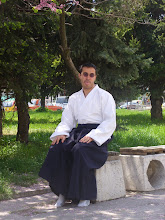
This blog entry starts by the news of a big and completely insolvent metallurgical factory being closed (Kremikovci)
From economical point of view it's been a long due decision
Naturally the ex-workers are grumpy and are protesting. However they do it in quite emotional style, describing scenes of complete desperation.
The issue I will attempt to discuss is why people choose to be unhappy, using the Kremikovci ex-workers as example
To make a reasonable blog the first order of businesses is to create definitions that will be used herein. Therefore
Choice will be the situation where individual has two or more possible, credible and viable lines of coherent action that would lead to specific predictable outcomes.
Unhappiness is used in this post as psychological condition where the subject experiences lack of motivation for daily activities, discomfort, anxiety over unfinished tasks (usually of monetary character), inability to influence key events in his/her life.
People are biological units belonging to homo sapience sapience sub-species.
As pointed above (1.3.) it is my observation that the ex-workers have chosen to be unhappy.
To illustrate it I will describe two mind sets toward the problem faced by the ex-workers (4 and 5).
The economic and emotional problem which they are facing in many cases is painted as struggle to make ends meet.
One manner to face up to the problem starts with denial and continues with exportation of the action in third party. The monetary problems make it difficult to meet daily expenses. Hence the short cut “someone else is to blame – I am the victim”. The result is unhappiness.
I have always liked the line attributed to Socrates walking through the market - “How many thing I do not need...”, which is the essence of the second mindset. Being able to leave one's attachment to property (real estate or other) and concentrate one's efforts on important issues such as health (or lack of stress), good nutrition and flexible solutions search is beneficial. Should one decide not live over one's means quite many expenses become redundant (restaurants, mortgage/debt payments, transportation, et
 c.).
c.). This post is not to advocate any Buddhist view of detachment, but to understand why would people choose to stay attached to things despite evident disadvantages of such choice.
I actually feel the need to underline that the previous point (5) suggest balance between attachment to property and financial resources availability, not detachment.
In the case of the ex-workers the great majority evidently has chosen to shift the main action outside them and wait someone to come and solve their individual problems (in this case the government, which they feel obligated to act to redress their gravenesses)
So to answer the question there are several option to choose from
Inertia of routine life prevents ex-workers to prioritize their expenses, or
Cultural issues (consumer society, nanny state) frame a model of over-excessive basic requirements (expenses), which the ex-workers try to cover, or
Non-linear rationality patterns prevent them from realizing the choice hence they can not act on it, or
They realize a psychological need to be victimized and feel morally superior, or
We can observe “freedom run” where the ex-workers are uncertain what they should do and leave union leaders to take decision, so they would not have to.
Solutions may appear in the second part of this post. But that will come in a while....
Thank you for your interest.

No comments:
Post a Comment